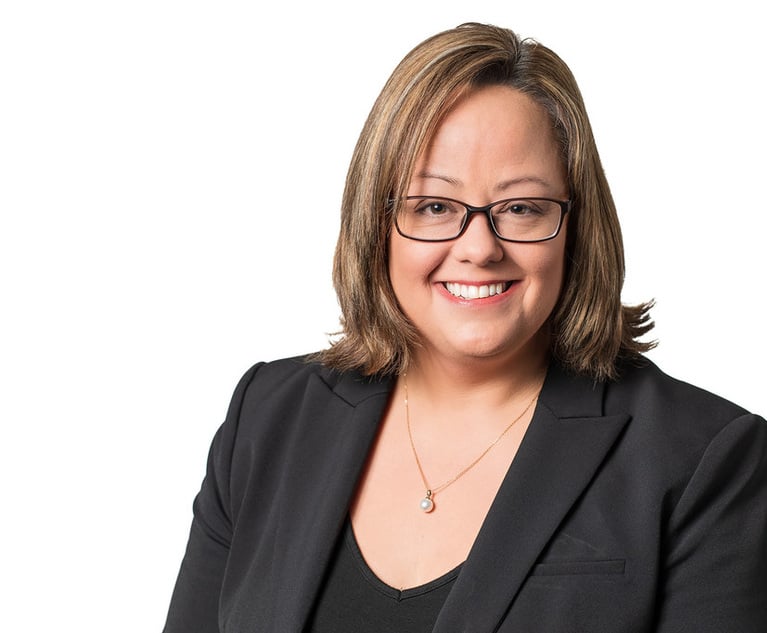Reed Smith weighs up alternative business structure conversion for London office
Firm sizes up benefits of joint ventures and profit-sharing with non-legal businesses
November 28, 2017 at 06:06 AM
4 minute read
Reed Smith is considering converting its London office to an alternative business structure (ABS) as the firm eyes up the possibility of joint ventures and profit-sharing arrangements with non-lawyer businesses.
The US firm – which would be one of the largest to date to make use of an ABS structure – is considering the switch to enable it to work more closely with third-party non-legal outfits, particularly in the consulting and technology spheres.
An ABS conversion allows law firms to bring non-lawyers into the equity and share profits, and Reed Smith is attracted by the potential of closer integration with teams or businesses run by non-lawyers that could offer something different to the firm's clients. The ability to share profits would help it attract and retain senior staff on the consulting side.
Europe and Middle East head Tamara Box (pictured) said: "We've been taking a very careful look at what the firm of the future looks like, and we are willing to be different in how we approach clients and what we can offer them. We have to figure out what clients want, and that takes more than just lawyers these days."
While no decisions have yet been taken, Reed Smith is keen to 'future-proof' itself so that it is ready to take advantage of opportunities as and when they arise. It is working with a number of external advisers - one of which is understood to be Deloitte – on the plans.
All Reed Smith partners globally are being consulted on the plans, with London partners first learning of the potential move around two months ago. One partner said: "All of the London partners have been raising a lot of questions. We want to make sure any reputational issues are addressed."
Box added: "As we have progressed this opportunity, we have had some great feedback from our partners in London, which has helped our thinking. However, as it is a complex situation, we won't be rushing into anything."
While an ABS conversion also enables law firms to take on external capital or pursue a public listing, Box said that this is not something Reed Smith is considering.
The firm told staff about the plans in an internal announcement earlier today (28 November).
The news comes amid a concerted innovation-focused push for Reed Smith, which last October launched an 'insight and innovation' team led by Alex Smith, who joined from LexisNexis as the firm's first innovation manager. The team focuses on helping in-house legal groups with operational transformation projects.
In London, Smith works with chief knowledge officer Lucy Dillon and counsel Siobhan Hayes, alongside an eight-strong US practice innovation team led out of the firm's Pittsburgh headquarters by senior manager David Pulice.
Reed Smith is also considering replicating its US records and e-discovery practice in the UK. In the States, the firm has a team of more than 70 lawyers providing such services, and it believes an ABS switch could present opportunities to build a similar offering for London clients.
A number of major UK firms have made ABS conversions since the Solicitors Regulation Authority began accepting applications in 2012. Many, such as Mishcon de Reya, Weightmans and Kennedys, have brought non-lawyers into their equity, while three UK law firms have now floated or set out plans to float - Gateley, Gordon Dadds and Keystone Law. Firms to have taken external investment via an ABS switch include Parabis and Keoghs.
In 2015, Cahill Gordon & Reindel became the first major US firm to register its London office as an ABS, a move the firm said enabled it to "avoid creating a two-partnership trust".
One corporate partner who has previously advised on a law firm ABS conversion said: "The way law firms are run nowadays is more like corporates. Partners have a say in the business but they have a management team that decides its priorities. In many ways, the model of an ABS can match more what corporate clients have – and that is where law firms are moving in terms of future culture and structure."
This content has been archived. It is available through our partners, LexisNexis® and Bloomberg Law.
To view this content, please continue to their sites.
Not a Lexis Subscriber?
Subscribe Now
Not a Bloomberg Law Subscriber?
Subscribe Now
NOT FOR REPRINT
© 2024 ALM Global, LLC, All Rights Reserved. Request academic re-use from www.copyright.com. All other uses, submit a request to [email protected]. For more information visit Asset & Logo Licensing.
You Might Like
View All


Stars and Gripes: Merging Firms Need a ‘Superstar Culture’ to Crack the U.S.
6 minute read
'If You Have the Offering, India Is the Shining Star': International Firms on Building Up Their India Desks
Trending Stories
- 1Corporate Counsel's 2024 Award Winners Performed Legal Wizardry, Gave a Hand Up to Others
- 2Goodwin, Polsinelli, Fox Rothschild Find New Phila. Offices
- 3Helping Lawyers Move Away from ‘Grinding’ and Toward a ‘Flow’
- 4How GC-of-Year Sam Khichi Has Helped CVS Barrel Through Challenges
- 5A Website is Not a ‘Place.’ What Took So Long To Get This Right?
Who Got The Work
Michael G. Bongiorno, Andrew Scott Dulberg and Elizabeth E. Driscoll from Wilmer Cutler Pickering Hale and Dorr have stepped in to represent Symbotic Inc., an A.I.-enabled technology platform that focuses on increasing supply chain efficiency, and other defendants in a pending shareholder derivative lawsuit. The case, filed Oct. 2 in Massachusetts District Court by the Brown Law Firm on behalf of Stephen Austen, accuses certain officers and directors of misleading investors in regard to Symbotic's potential for margin growth by failing to disclose that the company was not equipped to timely deploy its systems or manage expenses through project delays. The case, assigned to U.S. District Judge Nathaniel M. Gorton, is 1:24-cv-12522, Austen v. Cohen et al.
Who Got The Work
Edmund Polubinski and Marie Killmond of Davis Polk & Wardwell have entered appearances for data platform software development company MongoDB and other defendants in a pending shareholder derivative lawsuit. The action, filed Oct. 7 in New York Southern District Court by the Brown Law Firm, accuses the company's directors and/or officers of falsely expressing confidence in the company’s restructuring of its sales incentive plan and downplaying the severity of decreases in its upfront commitments. The case is 1:24-cv-07594, Roy v. Ittycheria et al.
Who Got The Work
Amy O. Bruchs and Kurt F. Ellison of Michael Best & Friedrich have entered appearances for Epic Systems Corp. in a pending employment discrimination lawsuit. The suit was filed Sept. 7 in Wisconsin Western District Court by Levine Eisberner LLC and Siri & Glimstad on behalf of a project manager who claims that he was wrongfully terminated after applying for a religious exemption to the defendant's COVID-19 vaccine mandate. The case, assigned to U.S. Magistrate Judge Anita Marie Boor, is 3:24-cv-00630, Secker, Nathan v. Epic Systems Corporation.
Who Got The Work
David X. Sullivan, Thomas J. Finn and Gregory A. Hall from McCarter & English have entered appearances for Sunrun Installation Services in a pending civil rights lawsuit. The complaint was filed Sept. 4 in Connecticut District Court by attorney Robert M. Berke on behalf of former employee George Edward Steins, who was arrested and charged with employing an unregistered home improvement salesperson. The complaint alleges that had Sunrun informed the Connecticut Department of Consumer Protection that the plaintiff's employment had ended in 2017 and that he no longer held Sunrun's home improvement contractor license, he would not have been hit with charges, which were dismissed in May 2024. The case, assigned to U.S. District Judge Jeffrey A. Meyer, is 3:24-cv-01423, Steins v. Sunrun, Inc. et al.
Who Got The Work
Greenberg Traurig shareholder Joshua L. Raskin has entered an appearance for boohoo.com UK Ltd. in a pending patent infringement lawsuit. The suit, filed Sept. 3 in Texas Eastern District Court by Rozier Hardt McDonough on behalf of Alto Dynamics, asserts five patents related to an online shopping platform. The case, assigned to U.S. District Judge Rodney Gilstrap, is 2:24-cv-00719, Alto Dynamics, LLC v. boohoo.com UK Limited.
Featured Firms
Law Offices of Gary Martin Hays & Associates, P.C.
(470) 294-1674
Law Offices of Mark E. Salomone
(857) 444-6468
Smith & Hassler
(713) 739-1250










